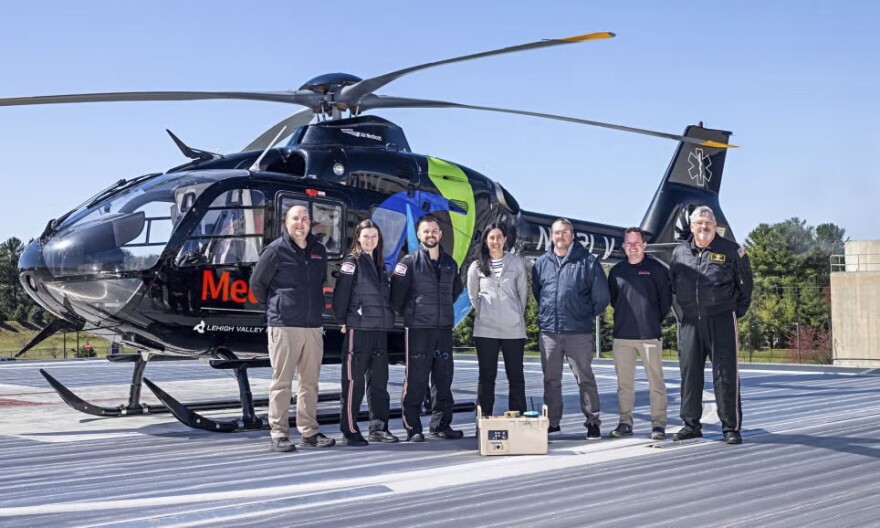SALISBURY TWP., Pa. — MedEvac’s mission is clear: deliver fast, specialized critical care when every second counts.
Its highly trained team — including paramedics, registered nurses, EMT drivers and pilots — stands ready to respond to any emergency, whether on the ground or in the air.
Now, it's added a powerful new tool to its lifesaving capabilities.
For the first time, Lehigh Valley Health Network’s MedEvac helicopters, just like their ground-based counterparts, are carrying whole blood.
That enhances the ability to treat patients with severe blood loss before or during transport.
"We'll be able to provide another sort of clinical tool to be able to help stabilize patients while we get them from the scene of accidents or from the hospital without a trauma surgeon available to one of our level one or level two trauma centers.”Bryan Evans, Director of MedEvac and Critical Care Emergency Transport at LVHN
What's more, the helicopters are the first in the country equipped with an Autonomous Portable Refrigeration Unit, or APRU, a compact onboard refrigerator that safely stores blood in flight, rather than using a cooler-type device.
The airborne blood program launched Feb. 23 and already is showing promising results, according to Bryan Evans, director of MedEvac and Critical Care Emergency Transport.
“We did a staggered go-live, and it is now available on all of our vehicles — four helicopters and two ambulances,” Evans said.
“So what this will allow us to do is, we'll be able to provide another sort of clinical tool to be able to help stabilize patients while we get them from the scene of accidents or from the hospital without a trauma surgeon available to one of our level one or level two trauma centers.”
A lifesaving solution

LVHN MedEvac helicopters are a familiar sight in the skies over the Lehigh Valley.
Though often seen overhead, the aircraft actually are based at four locations across eastern Pennsylvania: East Stroudsburg, Hazleton, Pottsville and Kutztown.
Their missions vary widely — they might be responding to a serious car crash, transferring a patient between hospitals, or flying to destinations as far as New York or New Jersey while serving a broad geographic region and patients of all ages.
“Our helicopters are stationed out in the more rural parts of our community," Evans said. "So, you know, we don't generally use helicopters very often in, say, Lehigh or Northampton County."
And in the world of emergency medical transport, when time is of the essence, access to prehospital blood absolutely could mean the difference between life and death.
"The studies from various groups have proven that the treatment for patients who are bleeding is blood and definitive care.”Bryan Evans, Director of MedEvac and Critical Care Emergency Transport for LVHN
A recent study published in the Journal of the American Medical Association found that patients who received whole blood early — alongside standard transfusions — had a 60% lower risk of dying within 24 hours.
“For many, many years, before blood was available outside of the hospital, we really would just have regular, normal saline or Lactated Ringer’s IV fluid available,” Evans said.
“And the science has shown over the years that that does not nearly adequately replace being able to be administered blood products.
"The studies from various groups have proven that the treatment for patients who are bleeding is blood and definitive care.”
‘The gold standard of care'
The adoption of the APRU has transformed airborne emergency medicine for LVHN, Evans said.
“The ideal gold standard of care now for patients outside the hospital that are bleeding is to replace it with blood,” he said.
The APRU is an FDA-listed device that, using a battery with a lengthy run time, provides constant cooling of blood products.
It has on-screen controls and records stored temperature, with a design that’s impact-resistant and waterproof.
The device not only meets, but exceeds, regulations for recording “cold chain data,” said Drew Regan, a business development specialist at Delta Development.

“The APRU can run off any power source, while also having an internal battery that is good for four days on its own,” Regan said.
“The thermal efficiency is so good on the device that even when the battery dies, the user still has 18 to 24 hours of blood storage time left inside.”
The APRU can store six 500 ml units of blood, which Evans said are on a 21-day cycle.
"The demand will, in most cases, probably be enough that we will use it before it expires in that 21-day cycle,” he said.
“But if not, we'll get it back to the hospital, and the goal is that it will go into circulation and be able to be used for a patient in the hospital that needs it.”
Regan said the APRU device is Bluetooth and cellular, letting medical directors and blood banks monitor blood supplies in real time — a key feature for oversight and comfort with the system.
Collaboration is key
“While many agencies across the country have adopted our devices, Lehigh Valley [Health Network] is the first in the country to put it in a helicopter, thanks to Matthew Meade and his countless hours of setting it up for his service,” Regan said.
Meade is a critical care transport nurse and was the project lead.
“At Delta Development Team we have a team of phenomenal engineers who helped turn the idea of a regulatory compliant prehospital blood refrigerator into a reality,” Regan said.
“A few military medics thought it up, but they were able to translate those ideas into something that really works.
“Matthew Meade actually did all the difficult legwork of getting the protocols in place, equipment demoing/testing and procuring and then the crew training.
“[He] has put in countless hours to ensure that this program was able to launch. He genuinely cares about providing top of the line, lifesaving care to those under his watch."
That spirit of cooperation has carried through implementation of the program.
“Our role is really one of partnership, because it doesn't matter if we're going to another smaller community hospital to transport a patient or to the scene of an accident," Evans said.
"We're only there because there are other providers and partners that have started to care for that patient.
“Everything that’s done is in partnership. We're excited and honored about what we are able to bring to it, whether it be in the ambulance or the helicopter, with treatment like this.
“But it wouldn’t be possible to do that if we didn't have such strong partnerships and so many other committed healthcare professionals and first responders out in the community taking care of those patients."
"Many people are able to be blood donors. So that would be something that we highly encourage."Bryan Evans, Director of MedEvac and Critical Care Emergency Transport for LVHN
Evans stressed that MedEvac is a link to get patients from the community to definitive care, but the public also plays a very important role in the blood on board the helicopters.
“If anybody's asking kind of how they can help, or what role they can play, blood donation is definitely a need in the community,” he said.
“I think that would be our one ask, is if people may be asking themselves outside healthcare, how they can help. Many people are able to be blood donors.
"So that would be something that we highly encourage. Because you never know. You could be helping out one of your neighbors or family members someday.”


